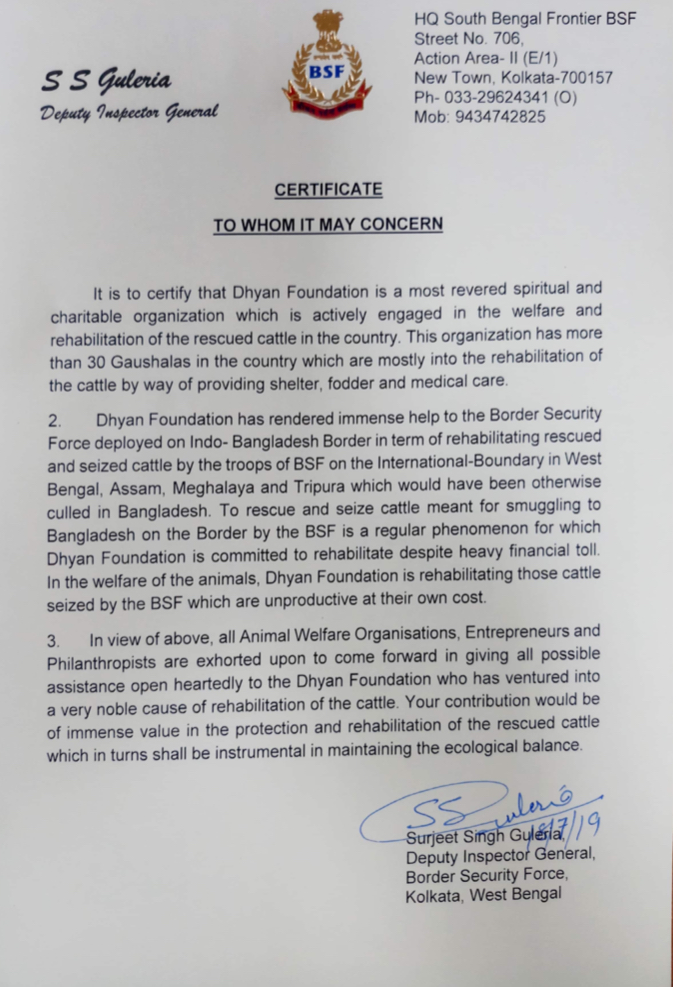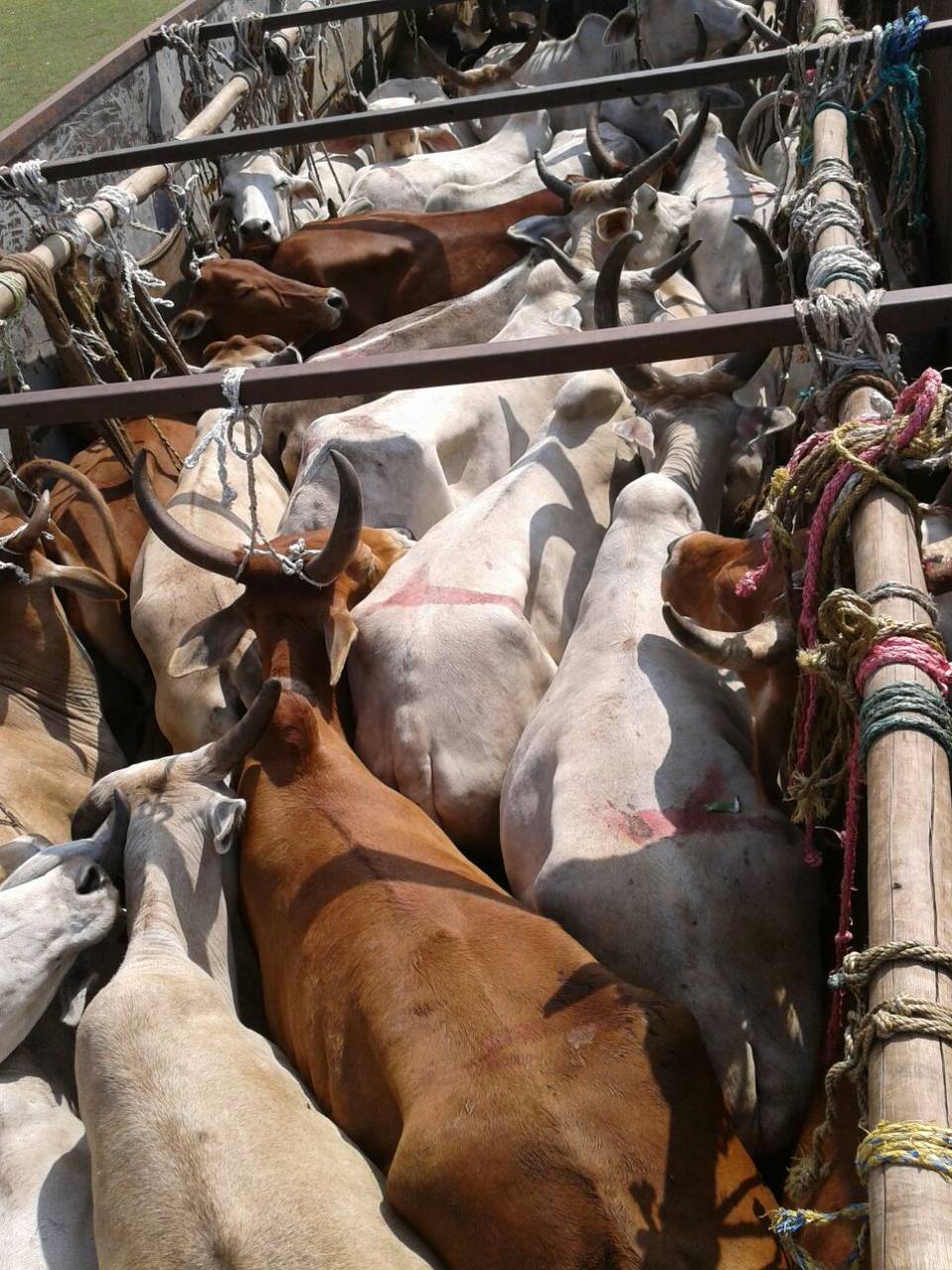As an animal welfare activist since 2012 (and Hon. Animal Welfare Officer with the Animal Welfare Board of India for five years between 2014 and 2019),I have done rescue and rehabilitation, mostly of cattle, in many parts of the country. The smuggling of cattle for the purpose of slaughter is rampant throughout India. The highways leading to West Bengal, NH-5/60and NH-6, are choked with cattle-smuggling. So is the one to Assam. The cattle are smuggled across the borders of these states to the slaughter houses of Bangladesh, from where beef, leather and other products are exported to the middle-east and Europe. It is a criminal business worth trillions of rupees, and the cattle mafia has proven links with terrorist outfits, hawala rackets and arms smugglers.
According to official and independent statistics,respectively, 30 to 70 lakh cattle were being annually smuggled across the India-Bangladesh border until 2015. Cops from the top to the bottom in every statealways gave a stock answer to my question as to why they allowed or looked away from a crime that seriously impacted India’s security and one that is not hard to control. “Saving the cattle is easy but who would rehabilitate them? Where? Who will pay for it?”Never mind if this ready excuse disguised the police-cattle mafia nexus in every state, the cops did have a point.
Huge resources are required for feeding and sheltering the cattle, not to mention the medical care they need following the terrible abuse at the hands of the smugglers. In the middle of 2019, the Border Security Force (BSF), encouraged by the support of Dhyan Foundation, a spiritual outfit, launched a massive rescue campaign along the West Bengal border with Bangladesh, the point of maximum smuggling. The Foundation committed itself to rehabilitating “as many cattle as the security forces could rescue”. So solid was its support to BSF that, by the year end, smuggling dropped by a dramatic 90 percent, although an unrelenting cattle mafia still tried its best to carry on the illegal trade.
According to the DF website, 30,000 cattle were saved by the BSF in about six months. They were first kept in BSF border outposts with temporary sheds and fodderprovided by DF, then transported to its shelters in West Bengal and neighbouring Jharkhand. The BSF was overwhelmed by the support: BSF DIG, West Bengal, S.S. Guleria, while paying glowing compliments to the Foundation (see Guleria’s letter), issued an appeal to “all the stakeholders to aid DF in its noble work”. The Foundation has also been working with the state police/BSF in Assam, Meghalaya and Tripura.

BSF overwhelmed by Dhyan Foundation’s support: Letter of BSF DIG
As someone who recently spent 17,000 rupees in six weeks on a stray sick kitten (it had a broken femur bone, and kidney/liver infections, requiring manydrips) before taking it to a DF shelter in Noida, where he died despite the best efforts to save him, it literally scares me to think about the resources required for about 50,000 animals in 40 odd DF-run/supported shelters and feeding points, 80 percent of them being unproductive and weak/sick cattle. The number of animals DF cared for, including monkeys, stray dogs and cattle, went up steeply during the two lockdowns since March last year. Still, scores of Foundation volunteers in various cities, unmindful of the health risks because of the pandemic, went out to feed them daily. This year, they even adopted pets whose caretakers died by the corona virus.
How does a spiritual outfit that began by sanitising yoga of commerce (DF has never charged money for the countrywide yoga workshops for two decades) get into animal welfare, and how are the funds managed? The answer is: by practicing compassion, which means affirmative action for the rescued and abandoned gauvansh and other animals, and by doing charity that pinches–a lot. Contingency funds, required because of the sudden flooding of the hurriedly-raised cow shelters in Assam and West Bengal, have been mobilised a few times in the last two years from within the Foundation. This is besides the regular charity theFoundation people do for their other human/animal welfare campaigns. Although well-off, the volunteers are not rolling in money. Yet, they rise to the occasion each time.
Charity and service, they say, are an integral part of their yogic practices. The yoga lessons imparted to them by their guru, Yogi Ashwini, have convinced them that the sacrifices they are making in terms of giving time, energy and money in the service of animals would go a long way in their spiritual evolution; that whatever good they are doing helps them balance out their own karma; that the only doing that counts is the doing for the other, especially for the mute animals; and the most important lesson of them all–in Kaliyug, charity and service are the surest path to spiritual evolution. Many volunteers cannot believe the sheer scale of the work they are doing. While they are incredulous, I am awed.
Although many NGOs helped rehabilitate the cattle I rescued in Andhra Pradesh, Telangana, Karnataka and Odisha, none of them could accommodate more than a few hundred cattle each. This, combined with the absence of government support in every state, forced me to change my strategy—from rescue/rehabilitation to the prevention of smuggling, but there were odds even here. I had to be physically present at key spots for months to prevent the trafficking that would re-start within the first few hours of me leaving. In short, I wasalways fighting a losing battle.
Seeing how DF’s support to BSF has helped dent the India-Bangladesh border cattle-smuggling, one of the most organised crimes in the country that threatens national security, I can’t help wishing for more such organisations. Lately, some people have started feeding the animals in Dhyan Foundation shelters on festivals, marriage anniversaries, birthdays and shraddhs, but it is a drop in the ocean. How wonderful it would be to have state governments and major corporate housesdedicate funds to animal welfare. For the real measure of our progress and how civilised we are, as Mahatma Gandhi said, lies in the way we treat animals. (For more information on DF activities, log on to www.dhyanfoundation.com)
The author is a senior journalist, based in Delhi

















Discussion about this post